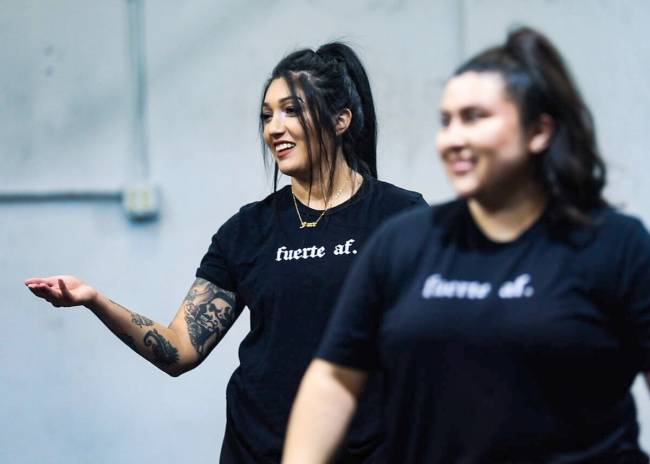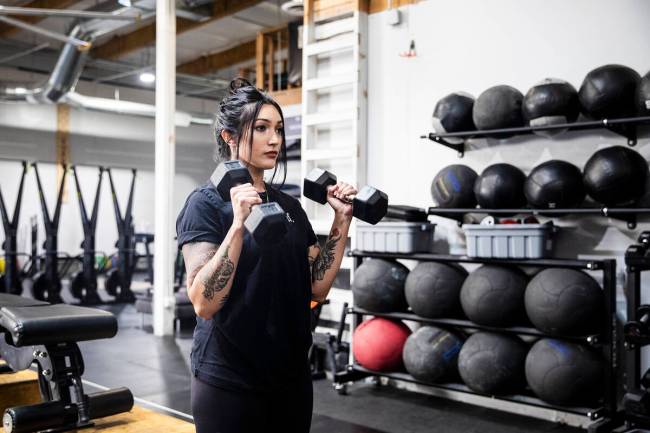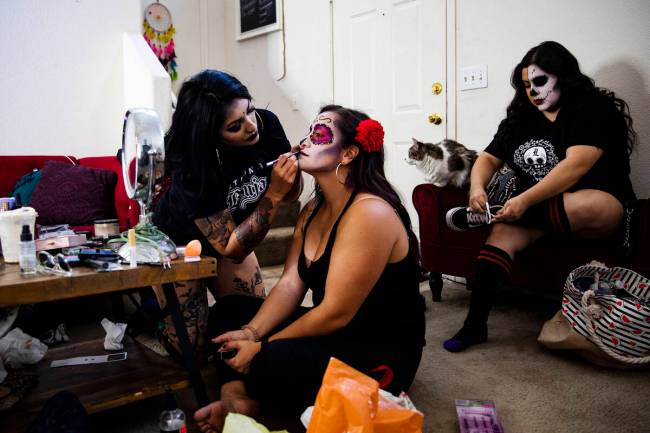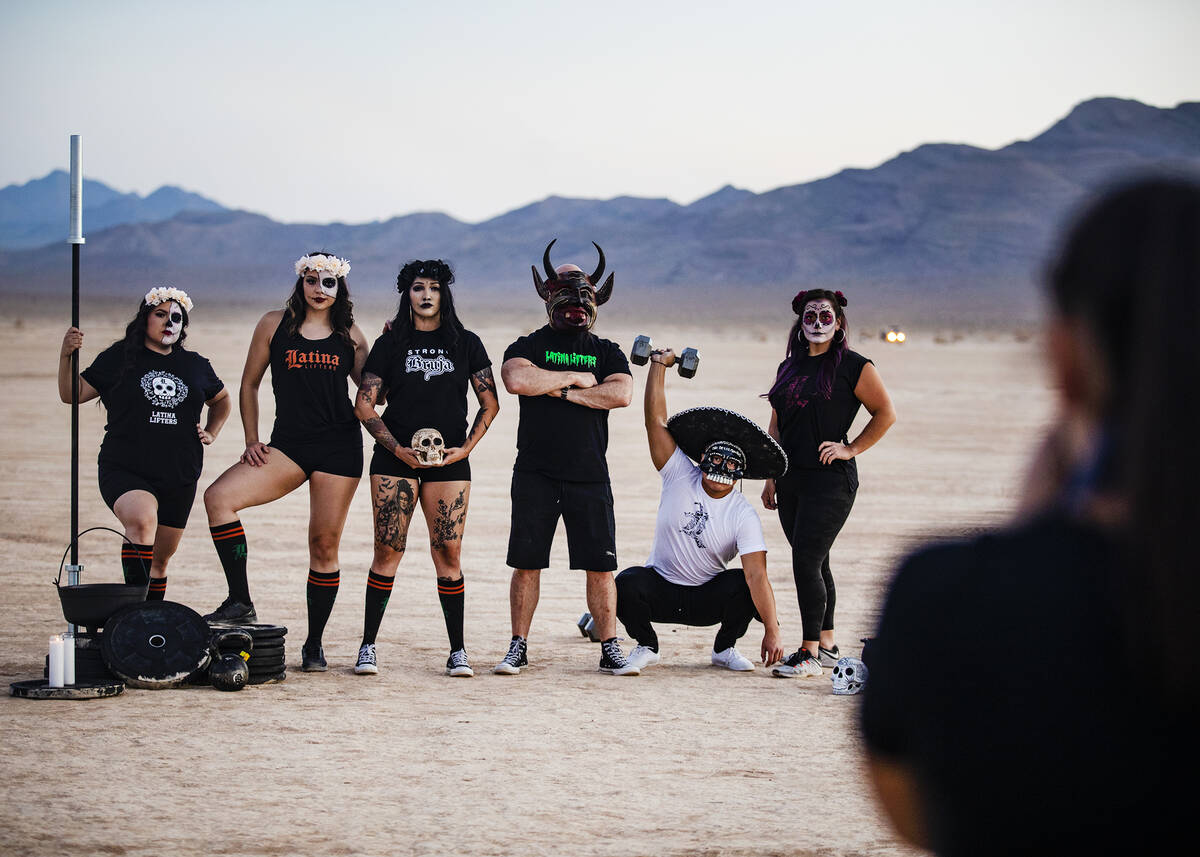Finding ‘Fuerte’: Latina Lifters founder Cinthia Martinez is on a mission
Childhood
The first time I felt uncomfortable in my own body was when I was 10 years old and doing a dress fitting. Schools in Mexico can be very extra — we had to wear a gown to do a dance. During the fitting, one of my family members made a comment and said that I didnt have a waist. And that I probably needed to be put on a diet. After that comment, I started hiding under baggy clothes. I started shopping in the boys’ department. I felt like what people thought was feminine didn’t fit with the way I looked. Growing up, I wasn’t very athletic, but I wanted to play sports. So many times I was told that sports are for boys, gyms are for boys, muscles are for boys. When you’re young, you don’t know any better. So if somebody tells you that if you do sports, you’re gonna look like a man, who are you to challenge that?
A new home
I came to the U.S. in 2006, when I was 14. When you move to a whole different country, you struggle a lot with assimilation. You’re trying to learn the language; you’re trying to fit in with the culture. I went to Rancho High School; there were a lot of Latino kids, but it was extremely hard to fit in. I heard, “You don’t look Mexican.” Is this supposed to be a compliment? Is this supposed to be insulting? Am I supposed to show you my birth certificate? Like, you know, I didn’t understand the stereotypes yet. And it was extremely hard for me to really understand like, am I supposed to look more Mexican in order to be accepted? Or if I look less Mexican, then it’s going to be easier in this country? 
From sickness to health
The first time I went to the hospital, I was probably 22 or 23. I was working, and then I just felt so much pain in my abdomen. I remember just feeling like I was not in control. It was scary. You know, you’re so young, you don’t know what could be wrong. I ended up at the hospital and I had kidney stones. That was probably one of the most painful experiences I’ve ever had. I was just told to watch my diet, drink water, avoid, you know, caffeine, and go on.
After that, it was just one thing after another: really bad migraines, fatigue. I was always sick, I was always catching the flu, I had a cough. I couldn’t understand why. I mean, I didn’t understand the concept of health. It was getting extremely hard, physically, economically and emotionally. I just knew I had to make a change.
I asked around and somebody said, Why don’t you try CrossFit? That year, everybody was joining CrossFit gyms. It was intimidating — walking into a gym, where you see athletes drop the bar and it’s so loud and everybody’s yelling at each other. But then I realized that’s what I needed. I needed that empowerment. I needed that motivation. I needed to feel like I belonged somewhere. 
The CrossFit gym I was attending closed down, and one of the coaches started a new gym. It was a new concept. He incorporated a lift program. And there was some strongman training, some weightlifting, Olympic lifting, some powerlifting. And then I started deadlifting. And I know that it sounds kind of silly, but I feel like that really changed my experience.
It feels so powerful to pick up a bar with over 200 pounds. I finally felt like I was in control of my body. My body wasn’t sick, it wasn’t weak, it wasn’t struggling. I was in control of what I was doing. Being able to pick up the bar just changed me. The gym isn’t just about weight loss. It’s about how you feel. It’s about feeling strong. 
I met other girls at that gym, we were able to create a community there. We celebrate each other’s lifts every single day for five days a week. We lift it together, we celebrate it together. And then we got to talking. Why isn’t there a community or a brand that has clothes, specifically for Latinas?
Birth of a business
My friend Teresa and I received a fitness box each month, and every month it was the same thing: We thought, I don’t want to wear this. The designs were not speaking to us. So we kind of just looked at each other and said, “What about Latina Lifters?”
I had no idea where to start, how to create a business, but I was able to research and get moving with it. The first step was creating a social media account. Because it wasn’t about selling shirts. It wasn’t about making money. It was about creating that platform and making sure that others felt like they had a safe space — that when they found Latina Lifters, they felt like this was home.
The first shirts were printed in my garage. We sold out of everything. The first day. Since 2020, we have grown the account to almost 27,000 followers. We have shipped Latina Lifters merchandise to Canada, to Asia, to Australia. 
A new way
Part of our community is to share stories and celebrate others. It’s not about a certain fitness level: Everybody starts somewhere; we’re all beginners. So we want to celebrate everything, even if it’s a five-pound personal record, or one pushup, one pullup, we want to make sure everybody is getting a spotlight.
When you see people that look like you that have similar stories, you’re going to feel seen. And that’s an opportunity. How do we expect our young adults and teens to want to be something when they don’t see themselves out there? So it goes back to what we’re used to seeing for Latinas and Latinos — oversexualized women, criminals, cholos, that’s all the media has to show. If we’re not cleaning, we’re cooking. We need to show the world that we can do more than that. We need to show the world who we really are. And that will be the only way we can really change the way people see us. We want people to feel inspired and realize that you can be proud of your heritage, and you can be lifting — and it’s OK to say it out loud. ◆












